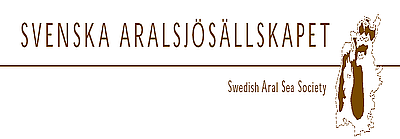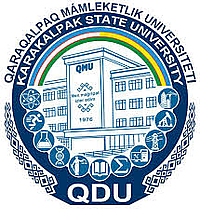Välkommen till Svenska Aralsjösällskapet
Vårt arbete
Svenska Aralsjösällskapet vill bidra till insatser för demokrati och utveckling i Aralsjöområdet. Det övergripande målet för vår verksamhet är att öka kunskapen i Sverige och världen om situationen i Aralsjöområdet. Vi vill påverka politiker och myndigheter, nationella och internationella organisationer till konkret handling till förmån för en hållbar utveckling i Aralsjöområdet.
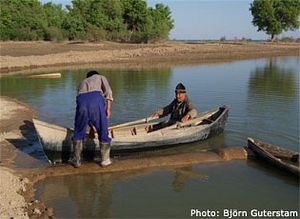
Idag saknas så gott som helt kunskap och opinion i Sverige. Vi vill också påverka den politiska beslutsprocessen i Sverige. Det sker fortfarande väldigt lite diskussion om Aralsjöområdet och tas få beslut om hjälpinsatser. Vår organisation vill se fler humanitära projekt i Aralsjöområdet.
Genom att ha en effektiv seminarieverksamhet vill vi väcka intresse för området så att projekt för en utveckling som gynnar jämställdhet och en hållbar utveckling kan starta i regionen. Den politiska situationen försvårar insatser men vi anser att det gör det ännu viktigare för vår organisation att fortsätta bedriva vår verksamhet.
Syftet med vårt arbete är att:
- Sprida information om Aralsjöområdet.
- Skapa opinion om miljö- och hälsosituationen i Aralsjöområdet.
- Påverka politiker och myndigheter, nationella och internationell organisationer till konkret handling.
- Genomföra egna projekt.
Tärningen är kastad i Samarkand
Bo Libert, april 2025
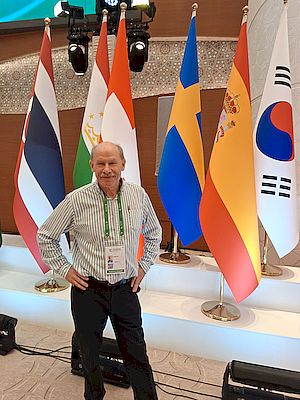
Flera stormakter uppvaktar länderna i Centralasien i hopp om ett djupare samarbete. Nu senast hölls ett högnivå-möte med EU-kommissionens ordförande Ursula von der Leyen på plats.
I mitt tidigare arbete på FN har jag i möjligaste mån försökt undvika stora konferenser där målet är att lösa de globala frågorna. Mitt arbete och intresse var inriktat på mer lokala problem. Men i förra veckan deltog jag i en klimatkonferens i Samarkand som organiserades av den uzbekiska regeringen.
Alla fem presidenter från de centralasiatiska ”stan”-länderna deltog liksom EU-kommissionens ordförande Ursula von der Leyen, så det var minst sagt ett möte på högsta nivå.
Att presidenterna sitter vid samma podium för att diskutera klimatet är inte förvånande. Centralasien har drabbats hårt. Klimatförändringarna har lett till att människor tvingats flytta och bli vad vi kallar klimatflyktingar. Temperaturer på närmare 40 grader kan noteras redan i månadsskiftet mars-april och under sommaren är det inte ovanligt med 45-50 grader. Jordbruket är beroende av bevattning, och tillgången på vatten minskar.
Länderna står betydligt närmare varandra politiskt nu än tidigare. På 2010-talet hade Tadzjikistan och Uzbekistan svårt att föra en dialog, och bara för ett par år sedan var Kirgizistan och Tadzjikistan i krig med varandra.
Det var skönt att befinna sig i en miljö där de politiska ledarna vill samarbeta – som en kontrast till vad som händer i resten av världen. USA och Ryssland deltog inte i konferensen, och var väl inte heller välkomna. De ändrade geopolitiska förutsättningarna är tydliga.
Att man lyckats samla dessa potentater beror på ett EU-CA (Centralasien) toppmöte som ägde rum dagen innan konferensen. Vikten av klimatarbete är något som regionerna är överens om och EU har betydande projekt i regionen inriktade på klimatanpassning, främst i vattensektorn. Det är också viktigt för EU att få Turkmenistan att minska sina stora metanutsläpp.
Intresset från Europa går dock utöver vatten och miljö. EU är angeläget om att få tillgång till kritiska metaller, som volfram och mangan. Transportkorridorer från Centralasien till Europa som inte passerar Ryssland är också viktiga, liksom att se till att Afghanistan inte utvecklas till ett hot mot andra länder. Det finns förstås grundläggande politiska värderingar i EU som inte delas av de autokratiska regimerna i Centralasien, men dessa meningsskiljaktigheter kom inte upp till ytan i Samarkand.
Uzbekistan har gjort framsteg när det gäller det bevattnade jordbruket. Stora investeringar görs för att använda vattnet bättre. Det är knappast ett mål att fylla Aralsjön igen. Men länderna nedströms – Kazakstan och Uzbekistan - är mycket medvetna om det kritiska läget för deras bönder och matproduktionen i framtiden, med förväntade minskande vattenflöden. I de gamla och slitna sovjetiska kanalerna försvinner så mycket som hälften av vattnet innan det kommer fram till fälten. Uzbekistan säger sig nu spara 8 km3 vatten per år – drygt 10 % - jämfört med åren 2010-2020. Investeringar i bättre kanaler och effektivare bevattningssystem ger resultat men mycket återstår att göra.
Två andra ”gröna” policy-inriktningar som man talar mycket om i Uzbekistan är planteringar av buskar och träd på den torra botten av Aralsjön samt utveckling av förnybar energi – vind och sol. Landet har stora gasfyndigheter som förstås är centrala för energiförsörjningen.
Den energiske presidenten i Uzbekistan lanserar initiativ efter initiativ, inte minst på miljösidan. 2025 har utropats som året för miljöskydd och grön ekonomi.
Kopplingen vatten-bevattning-energi mat är tydlig i Centralasien. Hur kan man se till att man kan balansera de olika användningarna av vatten? På den högsta politiska nivån i Kirgizistan och Tadzjikistan är svaret entydigt: Vi bygger vattenreservoarer för att generera elektricitet och samtidigt ha vatten tillgängligt för bevattning i rätt tid. Mycket stora dammar håller på att byggas uppe i bergen: Kambarata i Kirgizistan och Rogun i Tadzjikistan.
Det är fler stormakter som uppvaktar länderna i Centralasien i hopp om ett djupare samarbete. Kina har utvecklat kontakterna och gjort stora investeringar i många år. USA under Trump har ännu ingen uttalad position. Ryssland har fortfarande ett starkt fotfäste även om det försvagats. För Ryssland är invandrad arbetskraft från Centralasien viktig och tillgång till den ryska arbetsmarknaden är också viktigt för de centralasiatiska länderna med höga födelsetal.
Det är en utmaning för EU att etablera ett gott samarbete med regionen, och med detta förstatoppmöte i Samarkand är tärningen kastad.
Ont om vatten!
Bo Libert, april 2024
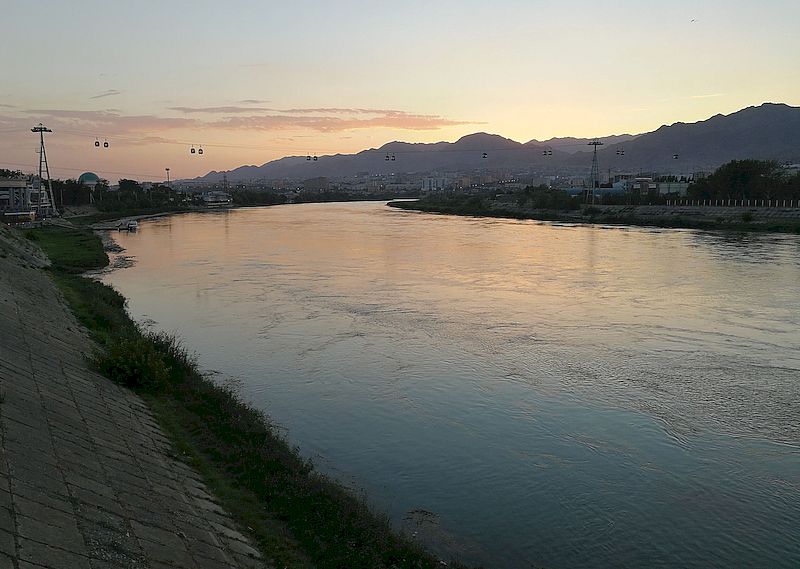
Syr Darya i Khudjand, Tajikistan. Foto: Bo Libert.
I februari-mars var jag på resande fot i Centralasien. Inte den bästa årstiden att resa i regionen. Minus 30 grader i den kazakiska huvudstaden Astana i mitten av februari, fortfarande snö i Tashkent. Alla känner till katastrofen i Aralsjön. En av de största sjöarna i världen tömdes under ett pardecennier då vattnet användes för att bevattna bomullsodlingar. Detta var och är en av de största vattenkatastroferna i historisk tid.
I den norra, kazakiska delen av Aralsjön har man byggt fördämningar och det som nu kallas Norra Aralsjön ger en rimlig livsmiljö. Fisken förökar sig och kan ge utkomst till fiskare. Men ingen talar om att rädda hela Aralsjön då den viktiga jordbruksnäringen är beroende av det vatten som finns tillgängligt.
Men nu är frågan om det vatten som skulle ha hamnat i Aralsjön räcker till. Det börjar bli ont om det vatten som tas från floderna Syr Darya och Amu Darya. Innan det ens kommer i närheten av sin egentliga destination.
Vad är det då som händer? Klimatförändringarna börjar bli tydliga samtidigt som befolkningen ökar markant. En tredje faktor är att Afghanistan börjat bygga kanaler som tar vatten från floden Amu Darya. Länderna nedströms är förstås oroliga för om vattnet ska räcka till. De senaste åren har också varit torra.
I brist på flodvatten har man börjat använda grundvatten i jordbruket. Än så länge borrar man utan någon kontroll och användningen är knappast uthållig på sikt.
Alla är medvetna om att vatten används alldeles för slösaktigt. Den infrastruktur med dammar och kanaler som byggdes under den sovjetiska perioden är gammal och bara hälften av vattnet kommer ens fram till fälten. Resten infiltreras eller rinner bort på annat sätt.
Länderna som ligger nedströms: Kazakstan och särskilt Uzbekistan lägger sen en tid ner stora resurser på att använda vatten mera produktivt. Uzbekistan har minskat bomullsodlingen samtidigt som textilindustrin tagit fart. Numera importerar man till och med råvara från USA! Kazakstan, Kirgizistan och Uzbekistan har separata ministerier som fokuserar på vattenförsörjningen.
Det är viktigt att förbättra samarbetet mellan länderna som delar tillgängligt vatten. Länderna i Centralasien har under de senaste åren kommit varandra närmare politiskt men de nationella intressena skiljer sig åt. För Kirgizistan och Tadzjikistan uppströms är elproduktionen under vintern det viktiga medan länderna nedströms vill ha vatten för bevattning under den varma årstiden. Diskussioner pågår om hur man ska kunna lösa detta svåra dilemma men det finns inga enkla svar. Länder som Schweiz, Tyskland och USA, internationella utvecklingsbanker, EU och FN stödjer försöken att hitta lösningar.
För egen del har jag varit del av ett schweiziskt projekt där Uzbekistan och Tadzjikistan har kommit överens om att gemensamt mäta vattenmängder som ska fördelas enligt avtal mellan länderna så att man inte lurar varandra. Ett litet framsteg.
För en effektivare användning av både vatten och energi är prissättningen viktig. Priserna på el ökar så sakteliga men vatten är fortfarande alltför billigt. I dessa mer eller mindre autokratiska länder är det viktigt att eliten inte upprör folk alltför mycket. Det finns flera exempel på att kostnadsökningar lett till upplopp och till och med revolutioner. Flera gånger i Kirgizistan och för två år sen i Kazakstan. Så länge man får leva i lugn och ro utan alltför stora problem så tycks ”folket” tolerera den tydliga bristen på demokrati.
Krisen som knackar på dörren är allvarlig. Kan de reformer som behövs formuleras och genomföras? Utmaningarna är stora i ett osäkert geopolitiskt läge med flera stormakter som vill öka sitt inflytande: Kina, Ryssland, USA och EU.
The Sardoba Dam Accident
Bo Libert, maj 2020
The Sardoba Dam Accident (PDF)
Den 1 maj 2020 inträffade den första dammolyckan i Centralasien med en betydande gränsöverskridande påverkan. En damm i Uzbekistan under uppbyggnad – Sardobadammen – brast och stora områden inklusive nysådd jordbruksmark översvämmades i Uzbekistan såväl som Kazakstan. Kraftigt regn och storm påstods vara orsaken, men det är uppenbart att dammkonstruktionen inte var tillräckligt stabil.
1. När det gäller dammolyckan i Uzbekistan med följdverkningar i Kazakstan så har länderna nu etablerat en "roadmap" för att utveckla vattensamarbetet. Kazakstan och Uzbekistan har mycket gemensamma problem men de senare som ligger uppströms har inte velat delat med sig av vare sig vatten eller information. Detta trots att båda länderna är parter till ECEs vattenkonvention med påföljande skyldigheter att samarbeta. Vi får hoppas att dessa planer på förbättrat samarbete ska kunna förverkligas. Kazakstan vill till exempel ha ett samarbete om vattenkvalitet vilket skulle vara ett stort framsteg för regionen.
2. Nedan en intressant bild på utvecklingen när det gäller vattenflödet som en konsekvens av beräknade klimatförändringar.
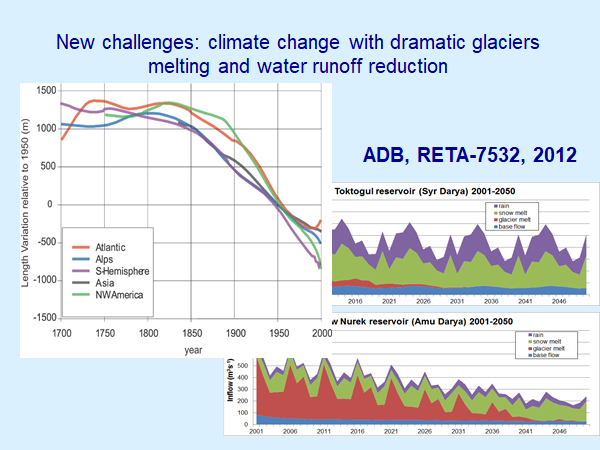
Jag vill särskilt peka på de röda fälten i diagrammen till höger som visar andelen av vattenflödet som kommer från glaciärer uppe i bergen och som inom några decennier försvinner helt. Vatten från glaciärerna är särskilt viktigt för bevattning eftersom detta vatten smälter av under sommaren i huvudsak.
3. Vi har nämnt sjön Balkhash i Kazakstan. Nedan ett litet stycke som jag skrivit och jag bifogar också för information en längre artikel av Bulat Yessekin, en entusiast med nydanande idéer som arbetar med frågorna i avrinningsområdet.
Lake Balkhash is one of the largest lakes in Asia and 15th largest in the world. It is located South of Almaty in Kazakhstan and belongs to a basin shared by Kazakhstan and China. The primary inflow is from the Ili River with its origin in China's Xinjiang region. The 8000 km2 Ili delta is a unique natural marshland and the lake is a Ramsar site very rich in biodiversity.
Lake Balkhash is now the largest freshwater lake in Central Asia after the shrinkage of the Aral Sea over recent decades. The lake is divided by a strait into two parts: a relatively deep, brackish eastern portion that is fed by several minor rivers, and a shallower, less salty western portion fed by the Ili River.
Like the Aral Sea, it is shrinking from the late 1900s as a result of the diversion of water, including from the Ili river. The Kapshagay reservoir and hydropower station was built on the Ili River in 1970. The filling of the reservoir impacted Balkhash seriously and the water level fell by 2.2 m and the volume was reduced, while the salinity of the western part increased. Also, as a result of a worsening water quality, the biodiversity is declining.
While the situation has temporarily stabilized, but the threat that the unique lake may deteriorate is still there. Increasing use of water for irrigation or other purposes, including in China, may ultimately cause another environmental catastrophe.
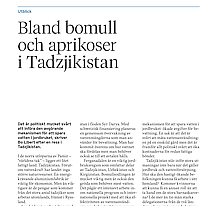
Bland bomull och aprikoser i Tadzjikistan
Bo Libert, maj 2023.
Det är politiskt mycket svårt att införa den avgörande mekanismen för att spara vatten i jordbruket, skriver Bo Libert efter en resa i Tadzjikistan.
I de norra utlöparna av Pamir -”världens tak” - ligger ett litet fattigt land: Tadzjikistan. Förut-om vattenkraft har landet inga större naturresurser. En energi-krävande aluminiumfabrik är viktig för ekonomin. Men än viktigare är de pengar som kommer från det stora antal tadzjiker som arbetar utomlands, främst i Ryssland.
Landet buntas oftast ihop med de andra centralasiatiska länderna norr därom men kulturellt har de närmare till grannen på andra sidan gränsfloden Amu Darya: Afghanistan. Farsi (persiska) är ett gemensamt språk.
Befolkningen växer fort, mer än 2 procent per år. Till skillnad från tidigare, under den sovjetiska perioden, är den nu till stor del aktiva muslimer. Mitt besök nyligen ägde rum under Ramadan och en majoritet av mina lokala kolleger fastade på dagtid så jag fick äta min lunch i ensamhet.
Jordbruket är beroende av bevattning. Även om det är grönt under våren och man kan njuta av vildtulpaner uppe i bergen så blir det snart hett och torrt.
Som i flera andra länder i regionen är jordbruksmarken fortfarande ägd av staten och bönderna har bara en tidsbegränsad rätt att använda den. Efter Sovjetunionens sammanbrott och ett inbördeskrig på 1990-talet fortsatte i många delar ett kollektivt jordbruk men med tiden delades kolchoser och sovchoser upp i mindre enheter. Familjerna med brukningsrätt kan inte sälja sin mark så man kan inte förvänta sig en konsolidering och ökade gårdsarealer. Kollektiva jordbruk där bönderna samarbetar finns till viss del fortfarande kvar.
Min resa till Tadzjikistan och Ferganadalen föranleddes av ett planerat samarbete med Uzbekistan i floden Syr Darya. Med schweizisk finansiering planeras en gemensam övervakning av vattenmängderna som man använder för bevattning. Man har kommit överens om hur vattnet ska fördelas men man behöver också se till att avtalen hålls.
Ferganadalen är en viktig jordbruksregion som omfattar delar av Tadzjikistan, Uzbekistan och Kirgizistan. Bomullsodlingen är mycket viktig men är också den gröda som behöver mest vatten. Det pågår ett intensivt arbete inom nationella program och internationella projekt med att öka effektiviteten av vattenanvändningen. Infrastrukturen som används för bevattning är i dåligt skick så mycket av vattnet försvinner genom infiltration och avrinning långt innan fälten. Här behövs stora investeringar.
En drivkraft för bönderna att spara vatten är att man kan sälja sin bomull lite dyrare om man använder en vatteneffektiv teknologi. En internationell organisation, Better cotton initiative, förmedlar kontakter till stora globala bomullsanvändare för att förmedla mer uthålligt producerad bomull.
För bönderna kan bomull vara en lönsam produkt men världsmarknadspriset varierar mycket. Ett år kan förtjänsten vara 1000 USD per hektar, ett annat år hälften så mycket.
Förutsättningarna i landet för att odla och exportera andra värdefulla produkter som frukt och grönsaker är goda och det finns enorma marknader i närliggande Kina och Ryssland. Men brist på samarbete mellan de små gårdarna och lagring och transport som stora flaskhalsar är avgörande hinder.
Men aprikoser är redan nu en viktig produkt som odlas i stor skala — och med mindre vatten-åtgång — för att torkas efter skörd. När man åker bil på landsbygden kör man igenom stora skogar av aprikosträd.
Tyvärr är det politiskt mycket svårt att införa den avgörande mekanismen för att spara vatten i jordbruket: ökade avgifter för bevattning. En sak är att det är svårt att mäta vattenanvändningen på en enskild gård men det är framför allt politiskt svårt att öka kostnaderna för redan fattiga bönder.
Tadzjikistan står inför stora utmaningar inte bara när det gäller jordbruk och vattenförsörjning. Hur ska den hastigt ökande befolkningen kunna få arbete i sitt hemland? Kommer kvinnorna att kunna få en annan roll än att ta hand om de stora barnaskarorna? I de mer än tio män starka delegationerna från de två länderna fanns inte en enda kvinna. Presidenten talade om familjeplanering för ett antal år sedan men har slutat med det.
Hur gick det nu med vattenförhandlingarna mellan tadzjiker och uzbeker? Jo, vi gjorde vissa framsteg. Inget slutligt beslut men man ser fördelen med samarbete på båda sidor. Ett utkast till avtal diskuteras nu av parterna.
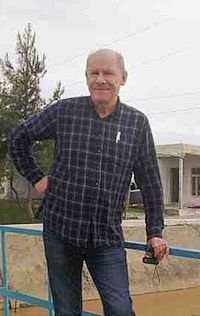 Bo Libert är Agr Dr och var lantbruksråd vid den svenska ambassaden i Moskva 1988-1990 och har därefter arbetat på OECD, Naturvårdsverket och i FN.
Bo Libert är Agr Dr och var lantbruksråd vid den svenska ambassaden i Moskva 1988-1990 och har därefter arbetat på OECD, Naturvårdsverket och i FN.
Artikeln Bland bomull och aprikoser i Tadzjikistan har tidigare publicerats i ATL och återges här med behörigt tillstånd.
Sida 2 av 15
